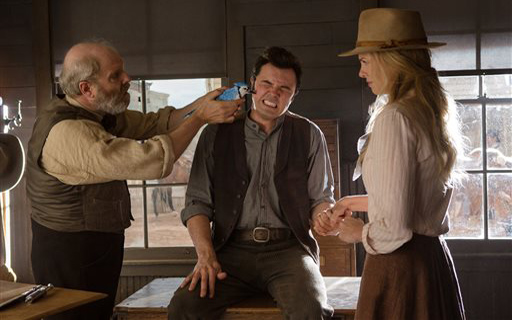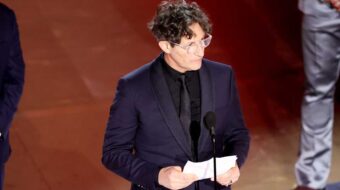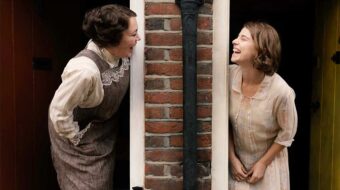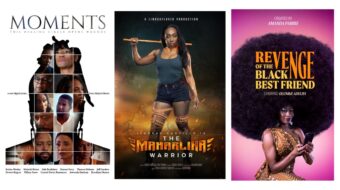
For those who enjoy genre spoofs and gross-out humor, Seth MacFarlane’s R-rated A Million Ways to Die in the West serves up a heaping pile of humor with a million mirthful movie moments. Others who prefer their comedy cerebral and refined may wish to hang up their spurs and sit this dizzy dosey doe out.
Although I also enjoy the dry wit of a Cole Porter or Noel Coward lyric, I laughed (what’s left of) my head off. Around 40 years ago, when Mel Brooks unleashed Blazing Saddles on an unsuspecting public, scenes such as Mongo’s horse-punching and the campfire farting vignette were considered to be irreverent and outré. In a similar way today, MacFarlane pushes the envelope of our more jaded 21st century sensibilities with scatological humor and jokes in bad taste that have rarely been seen on the big screen in a major Hollywood production. This is MacFarlane’s Family Guy and American Dad animated TV series on cinematic steroids, raising crudity to the level of high art. (Although Million holds back when it comes to breasts and female genitalia, which Sarah Silverman as the droll hooker Ruth merely describes, whereas male jewels are more graphically exposed. Why the shyness, Seth?)
As the auteur of Million (MacFarlane directed, co-wrote, and stars), he takes deadly aim at the genre conventions of the Western. Indeed, for our continent’s indigenous peoples, the Westward ho! expansion from sea to not so shining sea was nothing short of a cataclysmic, genocidal catastrophe that is now also turning into an ecological nightmare. Underneath MacFarlane’s critique of the Western lies an awareness of this unadorned history.
Like numerous John Ford classics, part of Million was shot on location in Monument Valley. Mac the Knife satirically deconstructs and debunks cowboy clichés, stressing that in stark contrast to silver screen hagiography, the Wild West was an awful place to find one’s self in. There is an especially delicious joke about the “selfishness” of American Indians, and at the very end, (Warning! Don’t leave before all the end credits have rolled!) whitey gets his comeuppance for caricaturing newly freed slaves at a county fair.
Like many a genre spoof, Million walks a fine line making fun of the Western’s archetypes and tried and true traits. Sometimes the mockery devolves into the very thing which the iconoclastic artiste has been poking fun at. Such may be the case vis-à-vis the relationship between Albert (MacFarlane) and Anna (Charlize Theron, who may be the horse opera’s most fetching, winsome gunslinger since Jane Fonda rode the purple sage in 1965’s similarly hilarious Cat Ballou.
Million is at its satirical best when it lampoons the mythos of gunslinging. As gunman Clinch Leatherwood, Liam Neeson does a good job of harpooning not only the long-ballyhooed celluloid stereotype of the High Noon-type triggerman, but of the action hero/tough guy roles the actor who once played Oskar Schindler has been lamentably cast in of late. Although it’s hard to assess the psychological impact or quantify the romanticizing of gunplay in our culture, who knows how many Westerns that pathetic, demented mass murderer in Santa Barbara and others of his shooting spree ilk have seen since birth?
MacFarlane’s screen romp is also at its finest when depicting Native Americans and takes on Hollywood’s caricatured “noble savage.” Million portrays them as leading Albert on an Oz-like trip wherein he attains clarity, if not a taste of enlightenment. Wes Studi — who played Magua in 1992’s Last of the Mohicans, the title character in 1992’s Geronimo: An American Legend, and the Na’vi chief in 2009’s Avatar – is, as usual, great, portraying Cochise. Studi steals the show.
Neil Patrick Harris also co-stars as Foy, a cross between city slicker and gunslinger who competes with Albert for the affections of Louise (played by Amanda Seyfried who, unlike Theron, is not, for some reason, very attractive here). Look for comic Bill Maher in a clever cameo.
As for Million’s plot, it’s secondary to the boundless laughs for those tickled pink by sheep penises, hats full of excrement, and the like. Be advised – A Million Ways to Die in the West is for those amused by vulgar boundary-stretching and sheer goofiness. To paraphrase Horace Greeley, it made me say: “Go Seth, young man!”
Photo: Universal Studios/AP












Comments